New Benchmark Tests For Variadic Template and Initializer List Versions of min
A correction of the results of N2722 and N2772
Author: Niels Dekker
Created: Saturday Oct 31, 2009
Last revision: Sunday Nov 1, 2009
There is a serious error in the benchmark test presented by
N2722, Variadic functions: Variadic templates or initializer lists?
by Loïc Joly, which is still there in
N2772, the revision by Robert Klarer.
Loïc has already informed the LWG about the error at
c++std-lib-25210,
Oct 30, 2009. The paper presented the results of benchmark tests of two
min implementations: a version that has an initializer_list<T>
as parameter, and a variadic template version. They were tested for
3, 13 and 24 arguments, and both int and std::string
as argument type.
The section Performance considerations concluded:
We can see that in both cases, and perhaps surprisingly considering the
theoretical performance considerations, the initializer_list version
consistently outperformed the variadic template version.
Unfortunately, because of the error, the presented results of the min
of std::string tests (Figure 1) are of no value at all, and the
conclusion is wrong. After fixing the error, I reran the tests, and found
that the variadic template version often outperforms the initializer list
version.
Figure 1. Incorrect min of string graph, as presented by both N2772 and N2772:
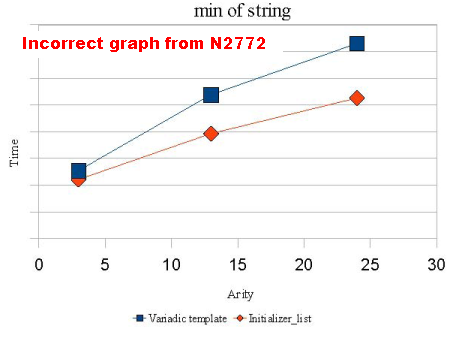
New tests
The new test results were from three little commandline test programs.
The test programs were compiled using
gcc-4.4.1-tdm-2 (TDM's GCC/mingw32)
and ran on an Intel Core2 Quad Q8200 at 2.33GHz, having Windows XP SP3 (32 bits edition).
The source files that are used for the tests are at
source/
InitializerListMinTest.cpp and
VariadicTemplateMinTest.cpp
are fixed and extended versions of the test source code by Loïc (used
for N2722 and N2772).
The main extension is that they test more arities (argument numbers):
3, 6, 9, 12, 15, 18, 21, and 24 arguments. InitializerListMinTest.cpp
uses the std::min(initializer_list<T>) implementation
provided by GCC.
Both InitializerListMinTest and VariadicTemplateMinTest repeat the min
calls 50000 times in order to get
a significant number of clock ticks.
TestMinOfThreeLists.cpp is
entirely new. It tests the performance of the min of three
std::list<char> objects of the same size.
Their size is varied from small to large, and for each size, the performance
of min is measured.
The performance is estimated by calling clock().
Results
The data that came out of the tests are stored in Excel files
(using Microsoft Excel 2003), and available at data/.
MinTestDebug.xls is the result
of running InitializerListMinTest.cpp and VariadicTemplateMinTest.cpp three times,
after debug compilation (no compiler flag other than -std=c++0x).
See also Figure 2 and 3.
MinTestOptimized.xls shows the results
of running InitializerListMinTest.cpp and VariadicTemplateMinTest.cpp three times,
after optimizing compilation (extra GCC compiler flag: -O3).
See also Figure 4 and 5.
TestMinOfThreeLists.xls shows the
results of running TestMinOfThreeLists: the first Excel sheet shows the result
for an optimizing compilation; the second sheet shows the result
for a debug compilation. In both cases, the variadic template version was so
fast that zero clock ticks were measured. On the other hand, there appeared a
clear linear relation between the performance of the initializer list version
and the std::list size. As shown at Figure 6 and 7.
The time (along the vertical axes) is expressed by the number of clock ticks.
Figure 2. min of int (debug compilation):
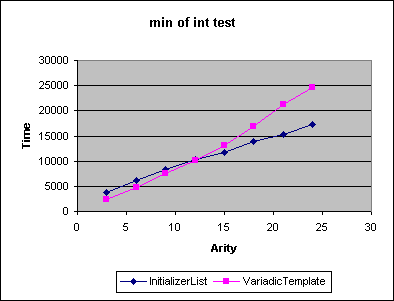
|
Figure 3. min of string (debug compilation):
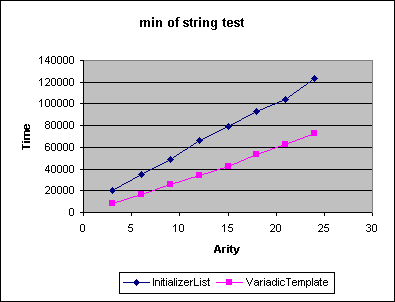
|
Figure 4. min of int (optimizing compilation):
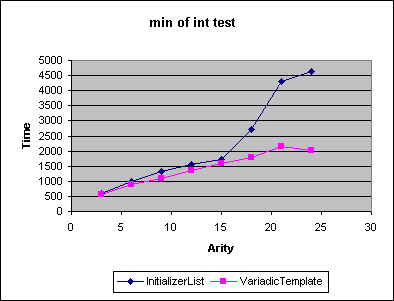
|
Figure 5. min of string (optimizing compilation):
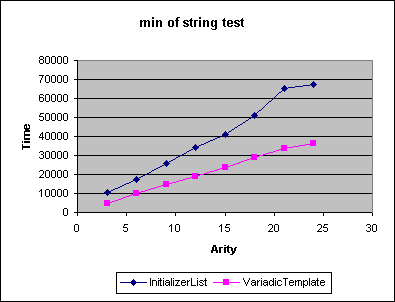
|
Figure 6. min of three std::list objects (debug compilation):
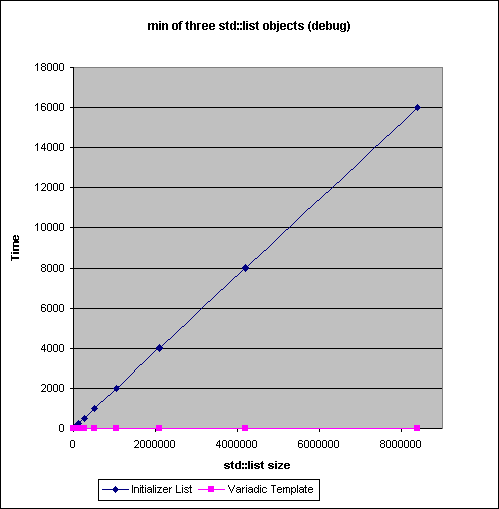
|
Figure 7. min of three std::list objects (optimizing compilation):
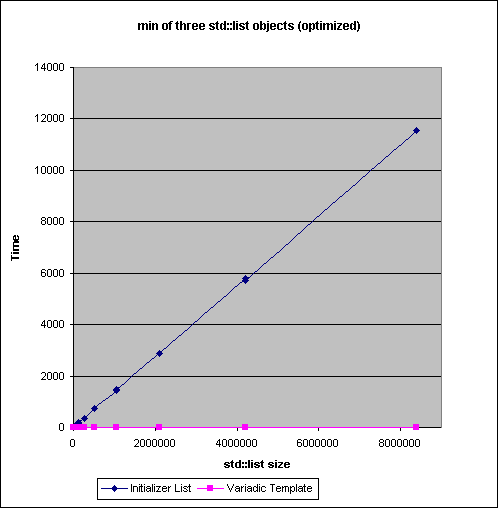
|
Conclusion
The performance of std::min(initializer_list<T>) is
potentially significantly worse than a similar variadic template,
min(const T&, const Args&...), as shown by the new
results for min of string. Moreover, the performance of
std::min(initializer_list<T>) is potentially linear to
the size of the objects themselves, as was shown by TestMinOfThreeLists.
Such a linearity is not found for the variadic template version. Instead,
it was found that the variadic template version can be extremely fast,
even when its arguments are std::list objects of a very large size.
I regret that I didn't get myself involved with the LWG discussions about N2722
and N2772, last year. At that time I hadn't yet studied initializer lists and
variadic templates well enough.
Thanks to Loïc for providing the original test code, admitting the error,
and providing me very helpful feedback.






